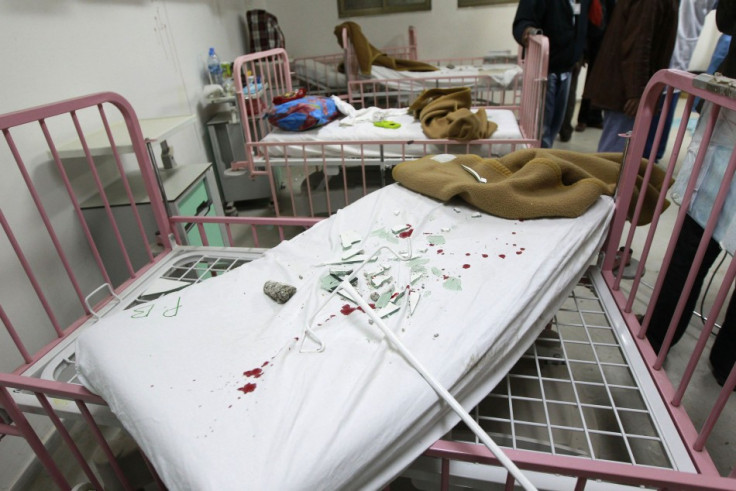Libya: Gaddafi regime's absurd attempts to trick the media

New allegations that the Gaddafi regime is trying to play with the general public's empathy for the civilian victims of the conflict re-surfaced yesterday after a group of journalists who were taken to see 'bomb victims' in a Libyan hospital found out the child they were introduced to had in fact been hurt in road accident.
The Libyan government's attempts to show how the Nato bombings are directly harming civilians backfired when a hospital worker revealed that a seven-month-old "air strike victim" had in fact been the victim of a car crash.
Foreign journalists in Tripoli were taken by bus to a hospital on Sunday night to see the seven-month-old girl, Nasib, who lay unconscious. A spokesperson for the authorities who was in charge of showing the journalists around claimed she had been hurt when a bomb exploded in a field near her house on the eastern edge of the capital a few hours earlier.
However, according to Reuters, a member of the medical staff slipped a note written in English to a reporter which said: "This is a case of road traffic accident. This is the truth."
It is not the first time that journalists have had reason to be suspicious of the regime's claims. Doubts had already been raised during an earlier visit to the bombsite in the suburb of Tajura where the little girl was said to have been injured. While the authorities were telling the media that a child had been wounded by the bombings, at the same time, Mohamed Elounsi, the son of the owner of the field, was also talking to some journalists and described how a black and white dog and a dozen or so chickens and pigeons had been killed in the evening strike, before affirming that nobody had been injured.
Elounsi said at the time: "I lost my birds, one dog and my cows nearly died." Shockwaves from the blast destroyed a room in one house and shattered numerous windows, he said. "My message to Obama is, 'Why do you send this [bomb] to my father's farm.'"
On the scene, residents gathered around the crater, measuring two by one metres, chanting pro-Muammar Gaddafi slogans. Initially, none of them mentioned any civilian casualties and it was only shortly before the bus departed that one neighbour said his four-year-old-daughter suffered cuts when a glass door shattered.
If the Libyan authorities have staged the hospital encounter and faked the real cause of Nasib's injuries they were this time much more careful of the details as upon arrival at the hospital, Gaddafi's aides directed the media straightway to the little girl and introduced a man as her uncle. When questioned about what had taken place, the latter said she had been injured in the Tajura missile strike.
A second man was also presented, this time as both a neighbour and a member of the health ministry and shouted "God, Muammar, Libya, and that's all" in an expression of his anger against Nato.
Intriguingly this man, who called himself Emad, was also present when journalists were taken to another suburb at 1am on Monday. This time apparently a "bomb" had landed in a back garden at about midnight "while the family were having lunch", according to a man presented as a spokesman for the family.
He simply added that the bomb had fallen from the sky, thereby obviously implying it came from a Nato strike, before adding that it had not exploded.
As the journalists grew even more suspicious, they began inspecting the debris and found Russian inscriptions on the bomb, which could indicate that the object could in reality be nothing more than a fragment dating back from the cold war.
Under pressure to explain the facts, the man called Enard has since then admitted he was a member of Gaddafi's media team.
The government representatives have until now failed to provide an official statement on the Russian bomb or the hospital incident, which potentially confirms the accusations of fakery that many have brought against the regime.
As Gaddafi allowed thousands of sub-Saharan African migrants on to overcrowded, unseaworthy ships, the leader was already accused of using the humanitarian crisis affecting the country, as a weapon to pressure Nato and the EU countries to stop them from backing Libya's rebels.
Libyan officials have since then been forced to admit that they did nothing to prevent overfilled and precarious boats full with African migrants leaving for Europe and embarking on very risky trips. Last week frail fishing boats full pf people desperate to reach Italy were overturned because of bad weather just off the Tunisian coast and 250 migrants are still missing.
The new revelations come at a time where the regime is becoming more and more reclusive and distant with foreign reporters, as the latter are seen by the authorities as being less lenient and more confronting. The regime's desperate attempts to shift public opinion have only suceeded in increasing its already ridiculous nad pathetic image. It is hard to conceive that they have not only decided to go killing their own people dbut to start using them for propaganda purposes.
© Copyright IBTimes 2025. All rights reserved.





















